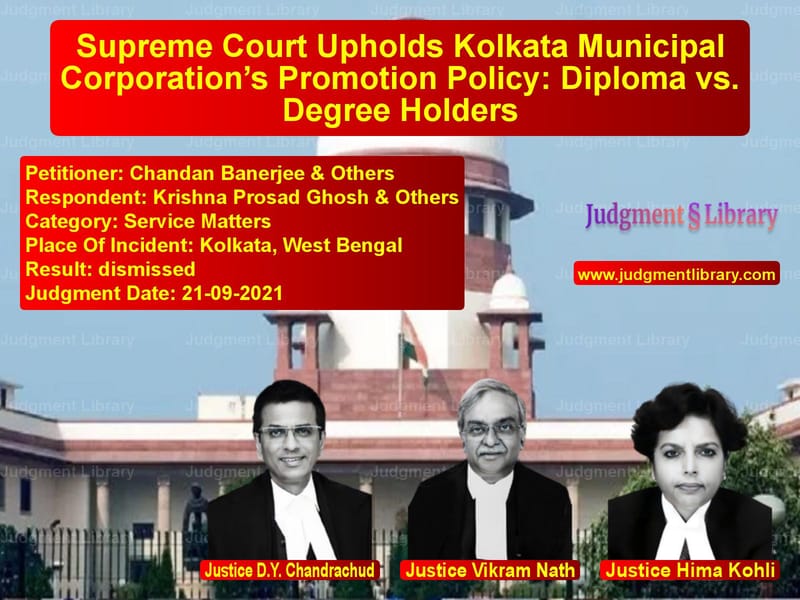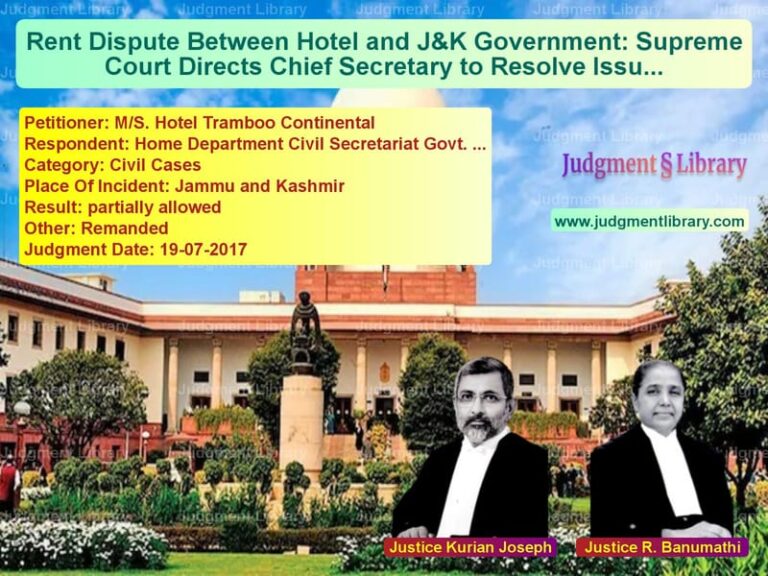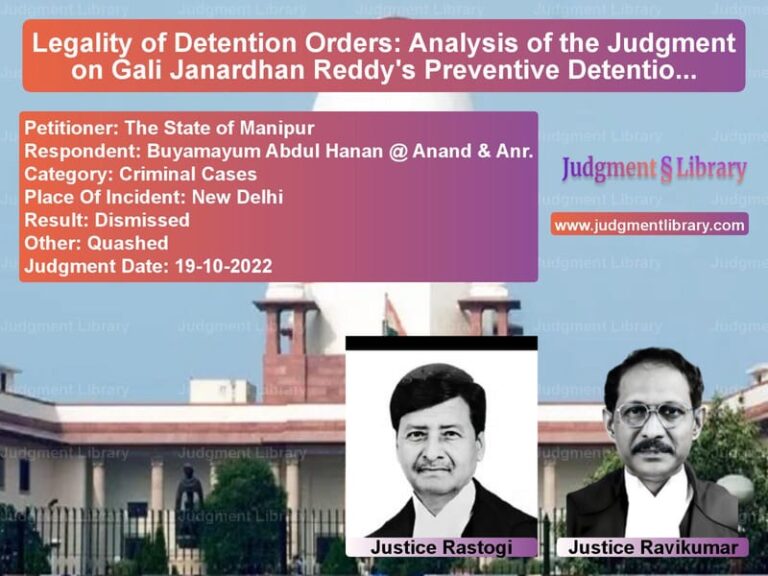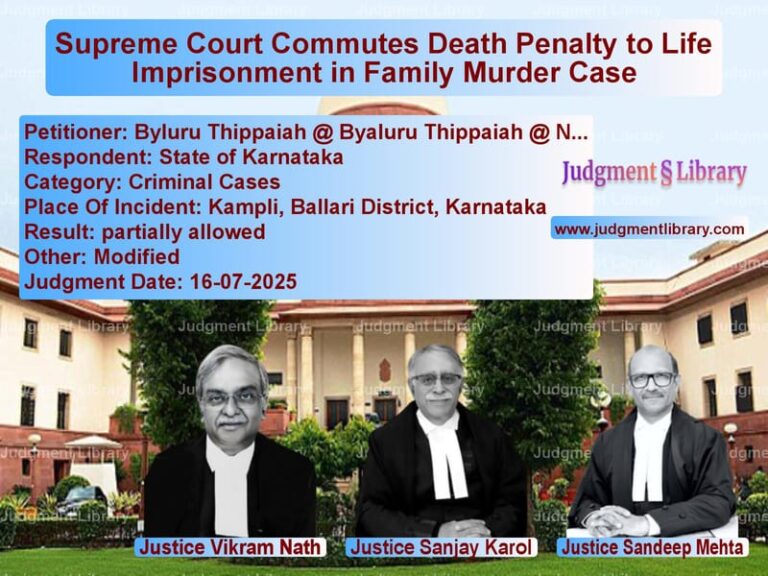Supreme Court Upholds Kolkata Municipal Corporation’s Promotion Policy: Diploma vs. Degree Holders
The case before the Supreme Court involved a dispute over promotion policies in the Kolkata Municipal Corporation (KMC). The appellants, a group of Sub-Assistant Engineers (SAEs) with diplomas, challenged the 2012 circular issued by KMC, which provided different eligibility criteria for promotion to the post of Assistant Engineer (AE) based on educational qualifications. The Supreme Court had to determine whether this distinction violated Articles 14 and 16 of the Constitution.
Background of the Case
KMC maintains two separate service cadres in its engineering department:
- Subordinate Engineering Service, where SAEs are appointed.
- Engineering Service, where AEs and higher-ranking officers are appointed.
SAEs are recruited with a minimum qualification of a diploma in engineering, though candidates with engineering degrees are also eligible. Promotion to the post of AE was traditionally based on a mix of seniority and merit. However, the 2012 circular introduced a distinction:
- Diploma-holding SAEs needed 25 years of service for promotion to AE.
- Degree-holding SAEs needed 13 years of service, with at least five years served after acquiring the degree.
The appellants argued that this classification was discriminatory since both diploma and degree holders were recruited through the same process.
Legal Issues Considered
- Whether educational qualification is a valid basis for classification in promotion.
- Whether the distinction between diploma and degree holders violated Articles 14 and 16.
- Whether the 2012 circular altered the existing recruitment rules unfairly.
Arguments by the Appellants
- They contended that since diploma and degree holders were recruited through a common selection process, treating them differently at the stage of promotion was unconstitutional.
- The distinction created a scenario where a junior degree-holder SAE could be promoted faster than a more experienced diploma-holder SAE.
- The policy did not give diploma holders a fair opportunity to obtain additional qualifications.
- The principle of equal opportunity in public employment was being violated.
Arguments by the Respondents
- KMC defended the classification as a necessary measure to improve efficiency in its engineering services.
- It argued that similar classifications had existed in past recruitment rules and had not been challenged.
- Higher educational qualifications were considered beneficial for the complex responsibilities of an AE.
- The policy did not alter the existing promotional avenues of diploma-holding SAEs but only supplemented them with additional opportunities for degree holders.
Supreme Court’s Observations
The Supreme Court, comprising Justices D.Y. Chandrachud, Vikram Nath, and Hima Kohli, analyzed several precedents, including State of Jammu & Kashmir v. Triloki Nath Khosa (1974), which upheld educational qualifications as a valid basis for classification in promotions.
The key observations were:
- The policy was designed to address stagnation in promotions while ensuring administrative efficiency.
- Classifying employees based on educational qualifications for higher responsibilities is reasonable and does not violate constitutional rights.
- The appellants failed to challenge earlier rules that introduced a quota system favoring degree holders.
- The distinction was not arbitrary since both diploma and degree holders had clear, albeit different, paths to promotion.
Final Judgment
The Supreme Court upheld the High Court’s ruling and dismissed the appeal. The key directives included:
- The 2012 circular was valid and did not violate Articles 14 and 16.
- The differentiation in promotional eligibility was justified based on educational qualifications.
- The appellants had no grounds to claim discrimination, as promotional avenues remained open to them.
Conclusion
This ruling reaffirms that governments and municipal corporations can establish educational qualifications as a basis for promotions, provided the classification is reasonable and aimed at enhancing administrative efficiency. The decision sets a precedent for similar disputes involving career advancement policies in public sector employment.
Petitioner Name: Chandan Banerjee & Others.Respondent Name: Krishna Prosad Ghosh & Others.Judgment By: Justice D.Y. Chandrachud, Justice Vikram Nath, Justice Hima Kohli.Place Of Incident: Kolkata, West Bengal.Judgment Date: 21-09-2021.
Don’t miss out on the full details! Download the complete judgment in PDF format below and gain valuable insights instantly!
Download Judgment: chandan-banerjee-&-o-vs-krishna-prosad-ghosh-supreme-court-of-india-judgment-dated-21-09-2021.pdf
Directly Download Judgment: Directly download this Judgment
See all petitions in Promotion Cases
See all petitions in Employment Disputes
See all petitions in Public Sector Employees
See all petitions in Judgment by Dhananjaya Y Chandrachud
See all petitions in Judgment by Vikram Nath
See all petitions in Judgment by Hima Kohli
See all petitions in dismissed
See all petitions in supreme court of India judgments September 2021
See all petitions in 2021 judgments
See all posts in Service Matters Category
See all allowed petitions in Service Matters Category
See all Dismissed petitions in Service Matters Category
See all partially allowed petitions in Service Matters Category







